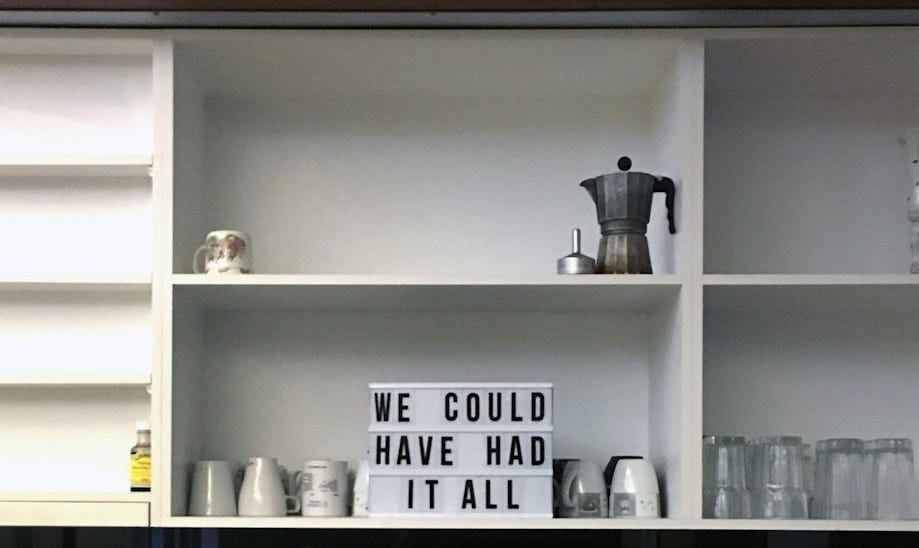LDS Stay-at-Home Moms: Punished for Doing It "Right"?
Exploring The Costs of Patriarchy & What To Do Instead
“No, 1Brittany, you aren’t a bad mom because you hate being a mom. You were simply told this was who you’re supposed to be, and it’s a lot harder than anyone lets on. You’re not the problem here,” I told my client.
Brittany was a young LDS mom who came into my office one crisp winter morning hoping to get help with her “anger issues,” as she called them. Over the next several months, what we uncovered was that several years ago, Brittany had dropped out of college to get married so she could support her husband’s schooling. When she got pregnant and began having children, she stopped working because “that’s what we’d been commanded to do. Have kids and be a stay-at-home mom (SAHM),” she said.
The problem, wasn’t Brittany’s anger. It was the many choices that she’d made that weren’t actually hers. In a high control religion like Mormonism, there is a tiny template to follow and a power hierarchy in which women must fit.
Brittany’s anger was valid.
Her whole life was a pipeline into motherhood. Her power deferred to the priesthood leaders and their “words from God.”
This is not a rare sighting, whether in my office, among family and friends, coworkers or acquaintances. Women are finding themselves, not just emotionally and physically disadvantaged, but economically too.
Recently, The Salt Lake Tribune published an article titled, “How obeying LDS Church teachings can leave some women in poverty.” It shines a harsh light on the economic fallout that many divorced LDS women in particular face after doing exactly what they were taught to do: stay home, raise children, and support their husbands.
They followed the rules—and now they’re left at the bottom, economically, emotionally and socially, in a society that values wealth and independence.
Dr. Susan Madsen—a professor, business leader, and researcher at Utah State University—whose work focuses on gender inequality and sexism in Utah, has spent years researching women’s experiences in both religious and business settings. She’s quoted stating:
“For years, the faith's leaders taught that mothers should stay home with their children. These women did just that, and paid a steep price when they entered the workforce.”
Imagine paying the steep price of admission into LDS Motherhood, only to pay a steeper one when your happily ever after disappears.
In the LDS faith, we are instructed that a girl’s ultimate purpose is to marry and become a mother. The framing isn’t really a choice—it’s a given.

Raised on a steady diet of homemaking lessons, firesides about the “right kind of man” to marry, and even wedding dress nights where young girls would parade around in gowns like a pre-marital dress rehearsal, the focus was always on temple marriage—not just to be sealed to your husband for eternity, but so your children would be “born under the covenant.”
Sure, we were also told to “get an education,” but the subtext was clear: ‘Just in case you need something to fall back on.’ A safety net. Not the path.
What wasn’t taught? The true costs of choosing to stay home. That degree you earned and never used does little at 40 when you’ve been out of the workforce for two decades. (Learn more about the motherhood penalty here.)
Once again, women may find themselves entering another hierarchical arena—this time, the workplace. These women are often dismissed and underpaid, not because they lack skills, but because of the lost years of a career outside the home.
Utah ranks dead last in the nation for gender pay equity. And that’s no coincidence. The cultural pressure for women to stay home leads many to re-enter the workforce in part-time or low-wage jobs, often out of necessity rather than ambition.
I remember being a young active LDS wife observing my husband’s workplace, noticing how few women were there, and thinking, Well, of course the men should earn more. They have families to support!
Not proud of that thought—but it shows how deeply internalized the LDS Church’s patriarchal messaging is. Women are taught to shrink, to defer, to uplift the men around them because they hold the holy priesthood. That same minimization follows women right into the workplace.
It’s not merely men who see women as less capable—women believe it too.
So what happens when you’ve done everything the Church told you to do, and your husband leaves?
Now you’re a single mother, still carrying the emotional labor of raising children, but also forced into the job market. And you’re starting from scratch—at the very bottom. In Utah, that bottom is even lower if you’re a woman.
The question I keep asking is: Why do women keep supporting a system that consistently ranks them beneath men?
The answer lies in identity. For many LDS women, their worth is intertwined with their role as a stay-at-home mom—the fulfillment of their divine purpose. Challenging that system isn’t just about questioning the Church, it’s about questioning who they’ve been told they are.
But here’s what I’ve seen: women aren’t lacking. Many of us go back to school (I did), and we become some of the most driven, focused students you’ll find. Many start working and realize:
I’ve been managing, organizing, leading, planning, and creating my whole life—I just wasn’t recognized or compensated for it.
As more women wake up to the harms of patriarchy, we’re left grappling with how to exist in a system we didn’t design—but were covertly shaped by. That reckoning is a big reason so many women are walking away from organized religion.
Even as we leave, we are not exempt from its consequences. Many of us will still end up like that single mom with five kids, making $10-12/hour at Walmart.
So how do we fight back?
Patriarchy clearly doesn’t help women—but women can help each other. That’s where our power is. It’s time to reclaim our maternal warmth and collective strength to build communities of care and mutual support.
Instead of paying for childcare we can’t afford, we form co-ops. We trade skills and labor. We uplift each other—not in the unpaid, self-sacrificing way we were conditioned to in church, but with intention of mutual aid. We give and receive, through reciprocity.
What ideas do you have to support women leaving Christian patriarchy?
How do we begin to repair the damage and build something better?
If you like my work consider becoming a paid or free subscriber & Join the novonexus.healspace community. www.novonexus.mn.co
This is a pseudonym to protect client privacy and confidentiality






The first step is to find women like us to have as a friend that will understand us. That is half the problem solved when we find empathetic hearts. Then we dedicate ourselves to empowering ourselves in whatever ways best for us